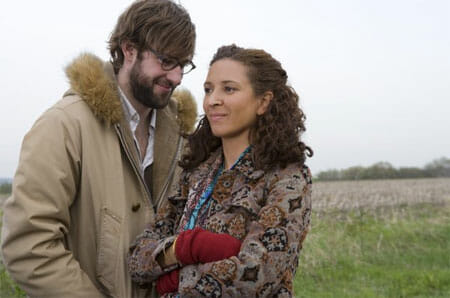
Release Date: June 5
Director: Sam Mendes
Writer: Dave Eggers & Vendela Vida
Cinematographer: Ellen Kuras
Starring: John Krasinski, Maya Rudolph, Carmen Ejogo, Catherine O’Hara, Jeff Daniels
Studio/Run Time: Focus Features, 98 mins.
John Krasinski, Maya Rudolph, Dave Eggers and Sam Mendes have one in the oven
In a blind taste test of the charming new film Away We Go, it’s doubtful that many movie-going citizens, even when observed by technicians in white coats, would accurately identify the film’s director. They might wrongly guess David O. Russell, thinking of his early offbeat comedy Flirting with Disaster, or name one of the young kings of tender and raunchy pregnancy humor like Jason Reitman or Judd Apatow, thinking of Juno or Knocked Up. They might even describe the screenplay as Eggers-esque, nodding to the impresario of the hip young literary magazines McSweeney’s and The Believer, and they’d be more right than they know.
But a quiet, meandering, slightly goofy film about an expectant mother (Maya Rudolph) and her lovable dim lug of a boyfriend (John Krasinski) does not immediately bring to mind director Sam Mendes, whose films like Revolutionary Road and American Beauty, for all their redeeming qualities, feel tucked and burnished and fussed over like the coveted statues they sometimes seem designed to earn. In sharp contrast, Away We Go breathes. Its affectless, tossed-off quality tells a lumpy story built out of a few scenes that fall flat but also a few that transcend, in part because they arrive unexpectedly from an untidy little comedy. It’s a film that pokes retrograde fun at nursing a child and wearing a baby close to the heart (admittedly, extreme versions of these wholesome styles of parenting) but then turns on a dime to stage a moment of profound sadness inside a strip club.
Away We Go is the first produced screenplay by Dave Eggers and novelist Vendela Vida. Burt and Verona are unexpectedly having a baby, so they feel the sudden urgency to settle their lives. They’ve lost traction in the years since college, and now in their thirties they zigzag across the U.S. to visit new cities and distant friends, testing each location, examining each couple, to find a suitable model. Where—and how—should someone with a bundle of joy live? It’s an identity crisis and a moral quandary in the form of an episodic trip like the ones in Eggers’ novels A Heartbreaking Work of Staggering Genius and You Shall Know Our Velocity. Burt and Verona’s history of fractured families show traces of Eggers’ autobiographical stories, but in collaboration with Vida his pallet extends beyond guy- and-sibling bonding to include couplehood as well.
Along the way, Burt is also looking for examples of women who’ve borne children but still have rockin’ bods, hoping to calm his fears that Verona will lose her appealing shape. Despite this obsession, he’s a likable character, thanks largely to John Krasinski’s puppy-dog performance. He’s likable, not for the often insensitive and childish things he says, but because he says them as a bearded 30-year-old kid who glows in the presence of his girl. But it’s Verona who anchors the couple, and it’s Rudolph who anchors the film. She played a slate of silly characters on Saturday Night Live, but she gives a reactive and nuanced performance in Away We Go, drawn from the character’s past and suffused with a palpable, nervous longing. With the right script, a good director and enough space, she shines in a dramatic role that has little precedent in her body of work, just as her SNL alum Molly Shannon did in Year of the Dog.
The lab of test subjects might not identify Mendes as the director, but ten or 20 or 50 years from now, they’d probably pinpoint the decade in which Away We Go was made. It’s the product of the 2000s, that period of American film whose sentimental comedies are about flannelled hipsters who forgot that adulthood was inevitable until it was thrust upon them in the form of broken hearts, sudden pain or the miracle of life. With low-key cinematography and a cast drawn from TV and independent film, Away We Go is comfy, like a pair of well-worn jeans. Talking on the phone in one scene, Krasinski seems to mimic Seth Rogen, and in another call he sounds like John C. Reilly, aural allusions that seat the film almost subliminally among its funny, emotional peers.
At the same time, the way these films honor grown-up seriousness in their touching conclusions makes me wish for the day when they start from there as a premise instead of situating each journey on the other side of the hill. However, I write this self-consciously as someone in his thirties who recently moved half way across the country with his wife and newborn, looking for the right way to live. Sometimes a film seems easy most of all because, for some of us, in some small way, it’s true.